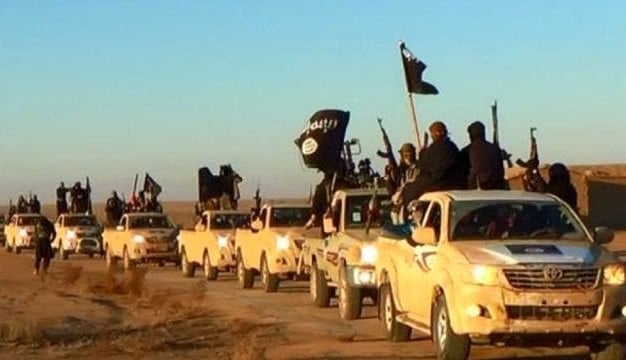Training “Moderate Terrorists”. Obama’s Failing Campaign Against ISIL

Things are not going well in Washington’s campaign against the Islamic State or Iraq and the Levant (ISIL). On Tuesday, it transpired from Defence Secretary Ash Carter that the US had trained a mere 60 Syrian opposition fighters to battle ISIL, rather poor results given an investment of $500 million authorised with Congressional wisdom. The reason behind this paucity lies in the supposedly rigorous vetting process that has, among the necessary criteria, promises to abide by the laws of war, and focus on “ISIL-first”.
Launched in May in Jordan, Turkey, Qatar and Saudi Arabia the training program was meant to gather 5,400 fighters by May 2016, all readied against the rampaging forces of the Islamic State. All in all, some 15,000 fighters are meant to form what the Pentagon envisages will be a Syrian moderate army doing the fighting and the dying on behalf of other states. Not exactly confidence boosting, but an idea still doing the rounds.
This was always going to be confused effort, given the continuing ambivalence about where Washington stands on the issue of the Assad regime. While suggesting that peace in Syria is only possible without Assad, President Barack Obama is rather short on how to combat both ISIL and the Syrian government forces.
A simmering argument is taking place within the administration over where the Syrian leader fits in the geopolitical puzzle. It was precisely such questions that landed the previous Defence Secretary’s head on a platter. Syria, in other words, continues to be inscrutable to the foreign policy denizens in Washington. As the Chairman of the Joint Chiefs of Staff, Gen. Martin Dempsey has tried to explain, “we’d like to see Assad go, but the State of Syria remain, without disintegrating.” The dream of a “moderate opposition in Syria” continues to fascinate Obama, while the truth of the matter lies somewhere in the extremities.
For all its ground efforts, the Pentagon is getting chicken feed. Senator John McCain, chairman of the Senate Armed Services Committee, was more than sceptical about the results. “Given the poor numbers of recruited and trained Syrian fighters thus far, I am doubtful we can achieve our goal of training a few thousand a year.”[1] Furthermore, as the Arizona senator noted, “degrading and ultimately destroying ISIL” was an impossibility with such figures.
Figures have been falling short all around. Last month, Carter also had to admit to Congress that the Pentagon was not doing well in finding “legitimate” Iraqi recruits to stave off Islamic state forces. Some 9,000 Iraqi soldiers have been trained, but optimistic projections hover around the 24,000 mark.
Carter was not dissuaded by such paltry dividends. His language to Congress was that of a teaching instructor keen to continue his bit of pedagogic piffle. Forget the actual outcomes; results matter less than the process of having a class. “We are also refining our curriculum, expanding our outreach to the moderate opposition, and incorporating lessons learned from the first training class.”
McCain’s retort was that the process should be less cumbersome, centred on such basic matters as a guarantee that US airpower and ammunition would be in ample supply. “It’s shameful to send people in and not assure them that we will defend them from attacks by barrel bombs” (Politico, Jul 7).[2]
A large problem here remains an acute inability on the part of Washington’s forces to identify credible local forces keen to muck in. Pinpointing targets during the air campaign has been poor, while many fighters have ample blood stained records and could also pose problems for the recruiters. This, after all, proved to be continuous problem in Afghanistan. In Carter’s words, “We make sure that they, for example, aren’t going to pose a green-on-blue threat to their trainers; that they don’t have any history of atrocities.”
On Monday, Obama also added fuel to the confusing fire by not clarifying who the US was actually training. Sure enough, he began by talking about “our mission to degrade and ultimately destroy the terrorist group ISIL.” The prowess of the “60 nation” coalition is mentioned, while the “comprehensive strategy” against ISIL is lauded.
But the official White House transcript on Obama’s press briefing stumbles into perplexity: “So, with the additional steps I ordered last month, we’re speeding up training of ISIL [Iraqi] forces including volunteers from Sunni tribes in Anbar Province.”[3] Commentators pinned it to the murkiness of strategy, or the old, illuminating Freudian slip.
Either way, it shows how fundamentally confused the direction of policy in the area is. The fantasy about a viable air campaign – more than 5,000 airstrikes to date – continues to filter through the ministry of fictions. “Tactical results,” as Carter calls them, have been registered, though these are never clear let alone calculable. ISIL can only continue to be thrilled by this gory, hideous mess.
Dr. Binoy Kampmark was a Commonwealth Scholar at Selwyn College, Cambridge. He lectures at RMIT University, Melbourne. Email:[email protected]
Notes
[1] http://www.aljazeera.com/news/
[2] http://www.politico.com/story/
[3] https://www.whitehouse.gov/

